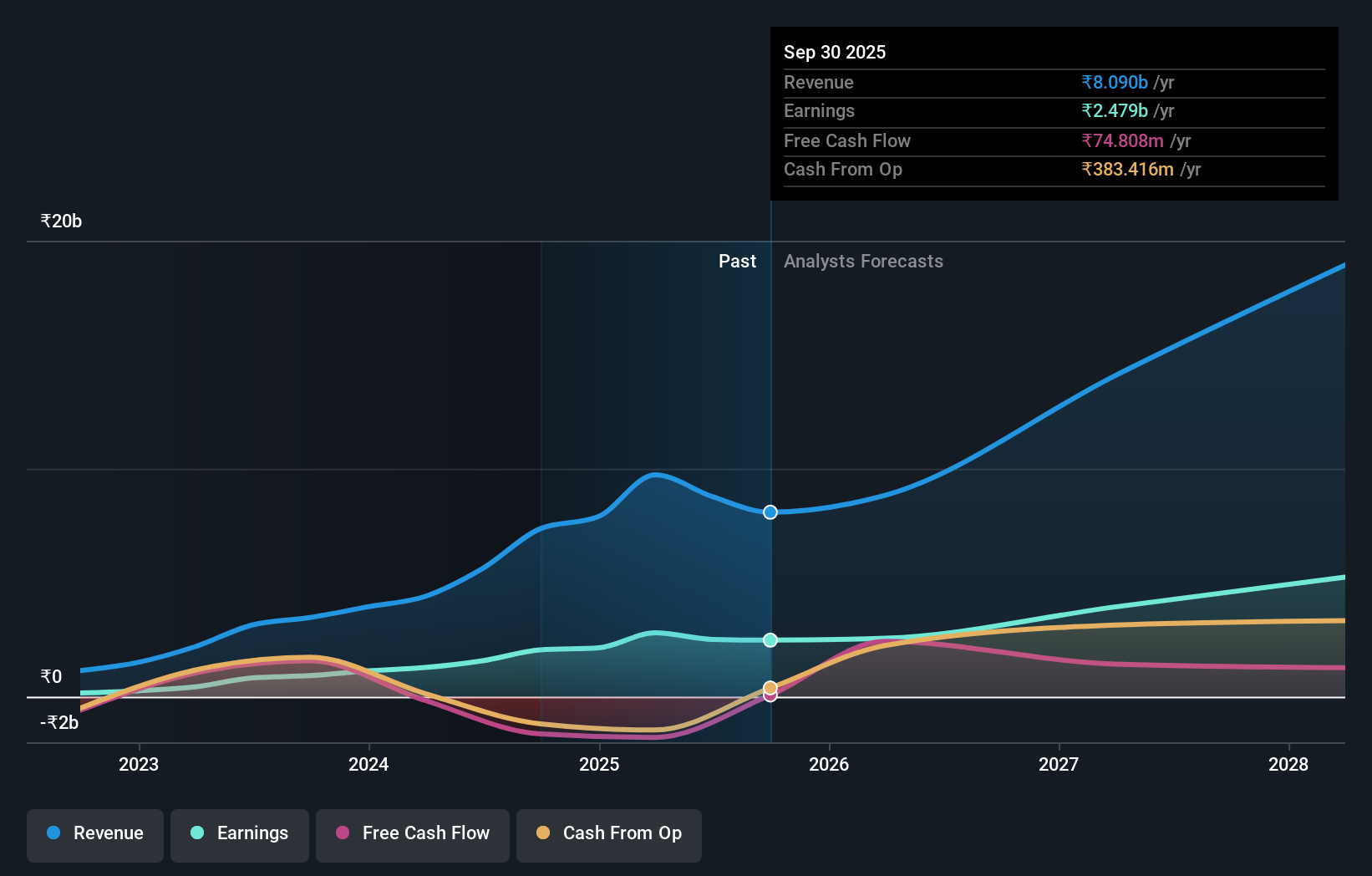- India
- /
- Aerospace & Defense
- /
- NSEI:ZENTEC
Zen Technologies Limited's (NSE:ZENTEC) largest shareholder, CEO Ashok Atluri sees holdings value fall by 4.2% following recent drop
Key Insights
- Zen Technologies' significant insider ownership suggests inherent interests in company's expansion
- A total of 6 investors have a majority stake in the company with 50% ownership
- Institutional ownership in Zen Technologies is 14%
To get a sense of who is truly in control of Zen Technologies Limited (NSE:ZENTEC), it is important to understand the ownership structure of the business. With 50% stake, individual insiders possess the maximum shares in the company. In other words, the group stands to gain the most (or lose the most) from their investment into the company.
And following last week's 4.2% decline in share price, insiders suffered the most losses.
In the chart below, we zoom in on the different ownership groups of Zen Technologies.
Check out our latest analysis for Zen Technologies

What Does The Institutional Ownership Tell Us About Zen Technologies?
Many institutions measure their performance against an index that approximates the local market. So they usually pay more attention to companies that are included in major indices.
Zen Technologies already has institutions on the share registry. Indeed, they own a respectable stake in the company. This implies the analysts working for those institutions have looked at the stock and they like it. But just like anyone else, they could be wrong. When multiple institutions own a stock, there's always a risk that they are in a 'crowded trade'. When such a trade goes wrong, multiple parties may compete to sell stock fast. This risk is higher in a company without a history of growth. You can see Zen Technologies' historic earnings and revenue below, but keep in mind there's always more to the story.

We note that hedge funds don't have a meaningful investment in Zen Technologies. Looking at our data, we can see that the largest shareholder is the CEO Ashok Atluri with 22% of shares outstanding. Meanwhile, the second and third largest shareholders, hold 16% and 3.5%, of the shares outstanding, respectively. Interestingly, the second-largest shareholder, Kishore Atluri is also Co-Chief Executive Officer, again, pointing towards strong insider ownership amongst the company's top shareholders.
We did some more digging and found that 6 of the top shareholders account for roughly 50% of the register, implying that along with larger shareholders, there are a few smaller shareholders, thereby balancing out each others interests somewhat.
While studying institutional ownership for a company can add value to your research, it is also a good practice to research analyst recommendations to get a deeper understand of a stock's expected performance. Quite a few analysts cover the stock, so you could look into forecast growth quite easily.
Insider Ownership Of Zen Technologies
The definition of an insider can differ slightly between different countries, but members of the board of directors always count. Company management run the business, but the CEO will answer to the board, even if he or she is a member of it.
Most consider insider ownership a positive because it can indicate the board is well aligned with other shareholders. However, on some occasions too much power is concentrated within this group.
Our information suggests that insiders own more than half of Zen Technologies Limited. This gives them effective control of the company. Insiders own ₹61b worth of shares in the ₹121b company. That's extraordinary! Most would argue this is a positive, showing strong alignment with shareholders. You can click here to see if they have been selling down their stake.
General Public Ownership
The general public, who are usually individual investors, hold a 35% stake in Zen Technologies. This size of ownership, while considerable, may not be enough to change company policy if the decision is not in sync with other large shareholders.
Next Steps:
While it is well worth considering the different groups that own a company, there are other factors that are even more important. To that end, you should be aware of the 1 warning sign we've spotted with Zen Technologies .
Ultimately the future is most important. You can access this free report on analyst forecasts for the company.
NB: Figures in this article are calculated using data from the last twelve months, which refer to the 12-month period ending on the last date of the month the financial statement is dated. This may not be consistent with full year annual report figures.
Valuation is complex, but we're here to simplify it.
Discover if Zen Technologies might be undervalued or overvalued with our detailed analysis, featuring fair value estimates, potential risks, dividends, insider trades, and its financial condition.
Access Free AnalysisHave feedback on this article? Concerned about the content? Get in touch with us directly. Alternatively, email editorial-team (at) simplywallst.com.
This article by Simply Wall St is general in nature. We provide commentary based on historical data and analyst forecasts only using an unbiased methodology and our articles are not intended to be financial advice. It does not constitute a recommendation to buy or sell any stock, and does not take account of your objectives, or your financial situation. We aim to bring you long-term focused analysis driven by fundamental data. Note that our analysis may not factor in the latest price-sensitive company announcements or qualitative material. Simply Wall St has no position in any stocks mentioned.
About NSEI:ZENTEC
Zen Technologies
Engages in the design, development, manufacture, and sale of training simulators in India and internationally.
Flawless balance sheet with high growth potential.
Similar Companies
Market Insights
Community Narratives



